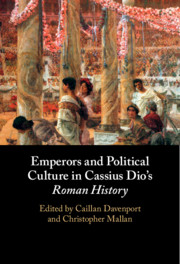Book contents
- Emperors and Political Culture in Cassius Dio’s Roman History
- Emperors and Political Culture in Cassius Dio’s Roman History
- Copyright page
- Contents
- Figures
- Contributors
- Preface
- Abbreviations
- Introduction Cassius Dio
- I Imperial and Political Narratives
- II Emperors and Biographies
- III Political Groups and Political Culture
- Chapter 9 ‘The People’ and Cassius Dio
- Chapter 10 Citizenship, Enfranchisement and Honour in Cassius Dio
- Chapter 11 The Company They Keep
- Chapter 12 Dio and His Friends
- IV Reception and Reflection
- Bibliography
- Index
Chapter 11 - The Company They Keep
Emperors and Their Associates
from III - Political Groups and Political Culture
Published online by Cambridge University Press: 23 July 2021
- Emperors and Political Culture in Cassius Dio’s Roman History
- Emperors and Political Culture in Cassius Dio’s Roman History
- Copyright page
- Contents
- Figures
- Contributors
- Preface
- Abbreviations
- Introduction Cassius Dio
- I Imperial and Political Narratives
- II Emperors and Biographies
- III Political Groups and Political Culture
- Chapter 9 ‘The People’ and Cassius Dio
- Chapter 10 Citizenship, Enfranchisement and Honour in Cassius Dio
- Chapter 11 The Company They Keep
- Chapter 12 Dio and His Friends
- IV Reception and Reflection
- Bibliography
- Index
Summary
Dio often portrays effective rulership in negative terms, defining a ruler's traits, policies, and associates by deficits when he sees a great vacuum at the center of power, an emptiness in an unsatisfactory emperor such as Commodus, waiting to be filled with unsuitable notions from the worst people. His history offers an array of faults to contemplate, many and specific, whereas positive terms are few and with little variety. Substandard rulers share negative traits typical of a tyrant’s behavior: cowardice, deceit, emptiness, gluttony, greed, pretense, overall unworthiness characterized by nullity: excessively improper, insatiate, shameless, unclean, unholy, lawless, senseless, impious, unseemly, uneducated. The only traits not negative in form are terrible indeed: savage, blood-guilty, cruel. The historian describes those of whom he approves with a few positive phrases – a good man, worthy, excellent – but here again goodness is oftener defined by what it is not: not greedy, deceptive, vicious, or any of the other things that unsatisfactory people are. The first part of the chapter offers a general account of specific traits and vocabulary. It is followed by a chronological review of specific leaders: some prominent Republican figures, especially dynasts of the Late Republic, and the emperors from Augustus through Elagabalus.
- Type
- Chapter
- Information
- Emperors and Political Culture in Cassius Dio's Roman History , pp. 240 - 264Publisher: Cambridge University PressPrint publication year: 2021



